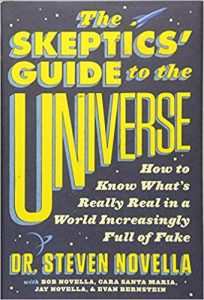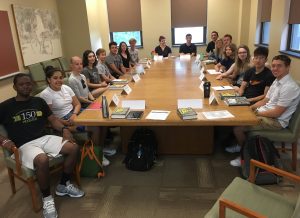Responsible believing is a skill that can be maintained only through constant practice. Since responsible believing is a prerequisite for responsible acting, we have a duty to foster that skill. (W.K. Clifford)
I like nonsense, it wakes up the brain cells. (Dr. Seuss)
I have made a ceaseless effort not to ridicule, not to bewail, not to scorn human actions, but to understand them. (Baruch Spinoza)
A deep streak of irrationality runs through humanity, especially in these days of “post-truth” and “fake news”. Belief that the Earth is flat has increased dramatically among American young people, and a curious conspiracy theory centered on the mysterious “Q-Anon” alleges dramatic secret battles between the “Deep State” and a satanic cabal for control of the US government. Horrific mass shootings are dismissed as “false flags” employing “crisis actors” for obscure political gains. Anti-vaccination groups have triggered new outbreaks of diseases we thought were nearly extinct, and quack medical “cures” are as popular as ever. Why is such nonsense so common when information has never been easier to access? What are the dangers to society when irrationality is common? Do we have logical tools to sort bad ideas from good? In this seminar we will examine conspiracy theories, crank science, revisionist history, and other topics from the edges of reason. We will use original literature, websites, and films to explore the lure of these ideas and their social origins. Our primary textbook will be The Skeptics’ Guide to the Universe: How to Know What’s Really Real in a World Increasingly Full of Fake. Our course objective is to improve our own critical thinking, writing and speaking … and, in the words of the late Carl Sagan, to light a candle in a demon-haunted world.
Syllabus.–The outline of our weekly course subjects is on our syllabus page. Note the due dates, special events and reading schedule. Since this is a “living syllabus” we can change up the order of events if we wish to as a class.
Attendance.–We will meet at 8:00 a.m. Monday, Wednesday, and Friday for lectures in Scovel 100. Attendance is required. You are expected to be in the classroom just before 8:00 a.m. so we can start on time. (I know, I know, but 8 a.m. classes build character! And I can guarantee that our schedule will not conflict with most other courses.)
Readings.–Each set of readings is to be completed before the week for which it is assigned. On most class days I will give you a set of questions or provocative points from the reading to stimulate discussion (our preparation questions). Missing the reading in this class becomes painfully obvious in the discussions and on the assignments. Besides, no one has reading more fun than ours! Note that this website (and the links I send you to) is part of your required reading. I will update the front page every week with discussion and links for our next week’s materials.
Grading.–Here is the summary of the assignments and how much they count towards your final grade:
Short papers (4): 10% each; due dates will be on the assignments.
Annotated Bibliography for research paper: 5%
Research Paper: 25% (Here is the Research Topic form due on September 11.)
Research presentation: 15%
Class participation: 15%; includes work on preparation question answers and miscellaneous short written assignments.
Now the details:
Short papers: There will be four short (2-5 pages) paper assignments. They will usually be analyses of news items, readings, websites, or particular issues which appear in class discussions. They will often be due a week or so after assignment. Here is the Short Paper #2 assignment due on September 13. Here is FYS short paper 3 Conspiracies. It is due Wednesday, October 23, at 8:00 am (via email). Here is the FYS short paper 4 Outline assignment. It is due Monday, November 11, by 8:00 am (via email).
Research bibliography, paper and presentation: Early in the semester you will choose some aspect of pseudoscience, conspiratorial history, medical quackery or the like to be your specialty in the class. The first thing you will do is collect resources on the topic (naturally) and then give me an annotated bibliography so I know you are on track. At the end of the course you will present your findings to the class and turn in a paper 15-20 pages long or so. We will talk about this Research Paper assignment every week, include subject choice, paper format, and oral presentation styles.
Class participation: I will expect you to be in class every day ready to share your observations and take part in conversations about the material. Everyone has an “A” in this part of the course until you show me otherwise.
Preparation questions.–Check these before each class and be ready to discuss them. I will occasionally ask you to read your responses, and sometimes I will collect them as part of your participation grade. You thus want to always have them written before class begins.
The Learning Center – APEX.–The Learning Center, which is in APEX (Gault library), offers a variety of academic support services, programs and 1:1 meetings available to all students. Popular areas of support include time management techniques, class preparation tips, and test taking strategies. In addition, the Learning Center coordinates peer-tutoring for several academic departments. Students are encouraged to schedule an appointment at the APEX front desk or visit the Learning Center Website for additional options.
An additional support that the Learning Center offers is English Language Learning. Students can receive instruction or support with English grammar, sentence structure, writing, reading comprehension, reading speed, vocabulary, listening comprehension, speaking fluency, pronunciation, and American culture through 1:1 meetings with the Learning Center staff, ELL Peer Tutoring, ELL Writing Studio courses, and other programming offered throughout the year. Students seeking ELL support are encouraged to visit the APEX front desk.
The Learning Center also coordinates accommodations for students with diagnosed disabilities. At the beginning of the semester, students should contact the Learning Center (ext. 2595) to make arrangements for securing appropriate accommodations. Although the Learning Center will notify professors of students with documented disabilities and the approved accommodations, students are encouraged to speak with professors during the first week of each semester. If a student does not request accommodations or does not provide documentation to the Learning Center, faculty are under no obligation to provide accommodations.
Our FYS Learning Center representative is Assistant Director Kaylynne Mahone.
Built with Wooster in mind, YOU@WOO (https://you.wooster.edu/) is a personalized web portal connecting you to online tools and campus resources to support your goals to Succeed, Thrive and Matter. This digital tool customizes information and resources based on the things you are interested in, worried about or working toward every day. Create a confidential profile on YOU@WOO to make the most of your college experience.
Academic integrity.–The following is a College policy statement: The academic program at the College seeks to promote the intellectual development of each student and the realization of that individual’s potential for creative thinking, learning, and understanding. In achieving this, each student must learn to use his/her mind rigorously, independently, and imaginatively.
The College’s understanding and expectations in regard to issues of academic honesty are fully articulated in the Code of Academic Integrity as published in The Scot’s Key and form an essential part of the implicit contract between the student and the College. The Code provides a framework at Wooster to help students develop and exhibit honesty in their academic work. You are expected to know and abide by the rules of the institution as described in The Scot’s Key and the Handbook of Selected College Policies.
Dishonesty in any of your academic work is a serious breach of the Code of Academic Integrity and is grounds for an “F” for the entire course. Such violations include turning in another person’s work as your own, copying from any source without proper citation, crossing the boundary of what is allowed in a group project, submitting an assignment produced for a course to a second course without the authorization of all the instructors, and lying in connection with your academic work. You will be held responsible for your actions. Particular attention should be directed to the appropriate use of materials available through the Internet. Whether intentional or not, improper use of materials is a violation of academic honesty. If you are unsure as to what is permissible, please contact your course instructor.
Schedule conflicts.–The faculty of the College has approved a policy regarding conflicts between extracurricular and academic events: The College of Wooster is an academic institution and its fundamental purpose is to stimulate its students to reach the highest standard of intellectual achievement. As an academic institution with this purpose, the College expects students to give the highest priority to their academic responsibilities. When conflicts arise between academic commitments and complementary programs (including athletic, cultural, educational, and volunteer activities), students, faculty, staff, and administrators all share the responsibility of minimizing and resolving them. As a student you have the responsibility to inform the faculty member of potential conflicts as soon as you are aware of them, and to discuss and work with the faculty member to identify alternative ways to fulfill your academic commitments without sacrificing the academic integrity and rigor of the course.
Textbook.–

Novella, S. 2018. The Skeptics’ Guide to the Universe: How to Know What’s Really Real in a World Increasingly Full of Fake. Grand Central Publishing, New York, 512 pages. ISBN-10: 9781538760536, ISBN-13: 978-1538760536 [Also on reserve at Andrew Library; ask for it by call number: Q162 .N68 2018]
Course librarian.– We are fortunate to have Zach Sharrow assigned to us as our FYS support librarian. We’ll be talking to him soon.
Course Teaching Apprentice.– Malik Hearst, a Philosophy and Psychology double major.
Course instructor.– I have an appointment schedule posted outside my office door (Scovel 120). Please sign up for an appointment if you have any questions or just want to talk. You may also send me email at mwilson@wooster.edu. Please visit me if there is anything at all you wish to discuss.
Mark A. Wilson
Department of Earth Sciences
The College of Wooster

You on our first day!
